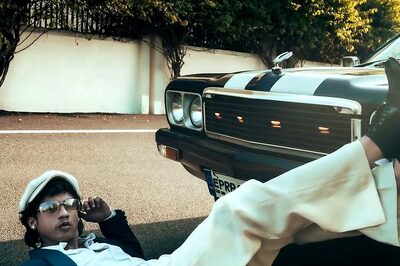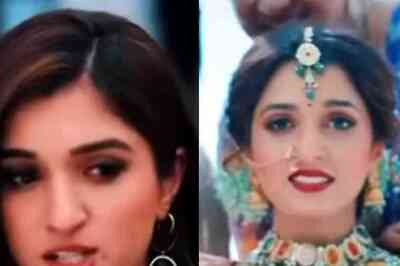
views
A caller from the BJP headquaters from Delhi had just informed him that he would be the party candidate for the prestigious Kota Assembly seat in the forthcoming elections. Which meant that the state BJP stalwart Lalit Kishore Chaturvedi had decided to move to a safer territory leaving Birla to slug it out against the incumbent MLA and a minister in the then Ashok Gahelote government, Shanti Lal Dhariwal.
Dhariwal, whom I had met a day before was just the inverse image of Birla, challenging anyone and everyone in the state BJP to contest against him.
Wishing Birla success on his electoral debut, I left for other districts of the Haroti region - Baran, Bundi, Jhalawar and Kota - once ruled by the Hara dynasty of the south-eastern Rajasthan.
On my way back a week later, from a roadside tea stall, I saw a garlanded Birla, in an open jeep, campaigning in the old part of the city. Bystanders vouching for his clean image looked impressed, but were far from convinced. " I might just vote for him, but then Dhariwal, I think would make it in the end"; was the common refrain.
That sounded so much familiar, so much similar to what I had heard in the autumn of 2002.
Ganderbal in Jammu and Kashmir post-independence has been a very special place. For years it has been for the Abdullahs, what Rae Bareli and Amethi has been for the Gandhis. The grand old man, Sheikh Abdullah held this seat for decades. Farooq Abdullah contested and won from here to become the chief minister.
In 2002, National Conference was fielding the Abdullah Generation Next - Omar. It was apparent that he would be succeeding his father if the National Conference managed to regain majority in the state Assembly.
Pitted against him was a short old man from the newly formed Mufti Mohammad Sayeed's People's Democratic Party (PDP) Qazi Mohammad Fazal.
On the day election campaign came to a halt in the Valley, I read a very interesting profile of the constituency. Written by a journalist of many years; and an acquaintance of mine, this is how he described the political climate in Ganderbal:
"Ganderbal of 2002 reminds me of a conversation I had with my father fifteen years back. A journalist by profession, he was then covering 1977 post-emergency general elections. Indira Gandhi was pitched against the ageing socialist Raj Narain in Rae Bareli. My father would tell me that the general mood in the constituency was against the Congress. But then again, nearly everyone he spoke to would add - as an afterthought that Mrs Gandhi would ultimately come out victorious.
How often have I heard this view in the Valley as I cover the elections here!!!."
What happened in Rae Bareli in 1977 is part of the political history in India.
A week after this piece appeared in print, Qazi Mohammad Fazal had his picture emblazoned in newspapers across the country with a caption - the Giant Killer of Ganderbal. The Abdullah clan had lost the prestigious Ganderbal seat for the first time.
In 2003, Om Birla defeated Shanti Lal Dhariwal to become one of the youngest members to enter the Rajasthan Assembly.
first published:January 28, 2007, 19:45 ISTlast updated:January 28, 2007, 19:45 IST
window._taboola = window._taboola || [];_taboola.push({mode: 'thumbnails-mid-article',container: 'taboola-mid-article-thumbnails',placement: 'Mid Article Thumbnails',target_type: 'mix'});
let eventFire = false;
window.addEventListener('scroll', () => {
if (window.taboolaInt && !eventFire) {
setTimeout(() => {
ga('send', 'event', 'Mid Article Thumbnails', 'PV');
ga('set', 'dimension22', "Taboola Yes");
}, 4000);
eventFire = true;
}
});
window._taboola = window._taboola || [];_taboola.push({mode: 'thumbnails-a', container: 'taboola-below-article-thumbnails', placement: 'Below Article Thumbnails', target_type: 'mix' });Latest News
I first met Om Birla on an early winter morning in Kota. Sharing the traditional Sindhi breakfast - Dal Pakwan - on oil-stained newspaper piece, he looked crestfallen. Hardly the body language one would expect of a budding political leader just days before Rajasthan was to go to polls to elect a new Assembly in 2003.
A caller from the BJP headquaters from Delhi had just informed him that he would be the party candidate for the prestigious Kota Assembly seat in the forthcoming elections. Which meant that the state BJP stalwart Lalit Kishore Chaturvedi had decided to move to a safer territory leaving Birla to slug it out against the incumbent MLA and a minister in the then Ashok Gahelote government, Shanti Lal Dhariwal.
Dhariwal, whom I had met a day before was just the inverse image of Birla, challenging anyone and everyone in the state BJP to contest against him.
Wishing Birla success on his electoral debut, I left for other districts of the Haroti region - Baran, Bundi, Jhalawar and Kota - once ruled by the Hara dynasty of the south-eastern Rajasthan.
On my way back a week later, from a roadside tea stall, I saw a garlanded Birla, in an open jeep, campaigning in the old part of the city. Bystanders vouching for his clean image looked impressed, but were far from convinced. " I might just vote for him, but then Dhariwal, I think would make it in the end"; was the common refrain.
That sounded so much familiar, so much similar to what I had heard in the autumn of 2002.
Ganderbal in Jammu and Kashmir post-independence has been a very special place. For years it has been for the Abdullahs, what Rae Bareli and Amethi has been for the Gandhis. The grand old man, Sheikh Abdullah held this seat for decades. Farooq Abdullah contested and won from here to become the chief minister.
In 2002, National Conference was fielding the Abdullah Generation Next - Omar. It was apparent that he would be succeeding his father if the National Conference managed to regain majority in the state Assembly.
Pitted against him was a short old man from the newly formed Mufti Mohammad Sayeed's People's Democratic Party (PDP) Qazi Mohammad Fazal.
On the day election campaign came to a halt in the Valley, I read a very interesting profile of the constituency. Written by a journalist of many years; and an acquaintance of mine, this is how he described the political climate in Ganderbal:
"Ganderbal of 2002 reminds me of a conversation I had with my father fifteen years back. A journalist by profession, he was then covering 1977 post-emergency general elections. Indira Gandhi was pitched against the ageing socialist Raj Narain in Rae Bareli. My father would tell me that the general mood in the constituency was against the Congress. But then again, nearly everyone he spoke to would add - as an afterthought that Mrs Gandhi would ultimately come out victorious.
How often have I heard this view in the Valley as I cover the elections here!!!."
What happened in Rae Bareli in 1977 is part of the political history in India.
A week after this piece appeared in print, Qazi Mohammad Fazal had his picture emblazoned in newspapers across the country with a caption - the Giant Killer of Ganderbal. The Abdullah clan had lost the prestigious Ganderbal seat for the first time.
In 2003, Om Birla defeated Shanti Lal Dhariwal to become one of the youngest members to enter the Rajasthan Assembly.


















Comments
0 comment